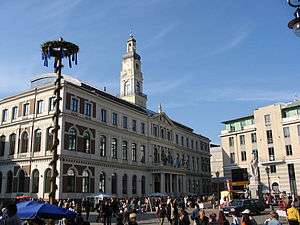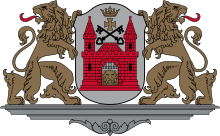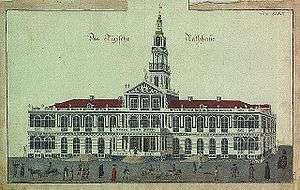Riga City Council
Riga City Council (Latvian: Rīgas dome) is the government of the city of Riga, the capital of Latvia. It is located in the Riga Town Hall (Rīgas rātsnams) at the Town Hall Square (Rātslaukums) in the very heart of Riga. The Riga City Council consisting of 60 councilors who are elected every 4 years is established on the basis of party factions.

Riga City Council Rīgas dome | |
|---|---|
 | |
| Leadership | |
Edvīns Balševics (Ministry of Environmental Protection and Regional Development) | |
Artis Lapiņš | |
Aleksejs Remesovs | |
| Structure | |
| Seats | 60 members |
Political groups | Government (Suspended)
Opposition (60) (Suspended) LA: 8 seats Unity: 4 seats Faction of Independent Deputies: 4 seats For Riga!: 4 seats Independent: 5 seats (as of February 2020)[1][2][3][4][5][6]
|
| Elections | |
Last election | 21 June 2017 |
Next election | 29 August 2020[7] |
The work of the Riga City Council is organized by the Chairman, Deputy Mayor (both offices vacant since 25 February 2020), the Presidium, City Executive Director, District Executive Directors and the staff of municipal institutions and enterprises.
The Presidium of the Riga City Council consists of the Chairman of the Riga City Council and the representatives delegated by the political parties or party blocks elected to the City Council.
In February 2020 the City Council headed by Oļegs Burovs was dissolved by the Saeima and the President of Latvia, following three successive council meetings at which a quorum was not obtained and due to the failure to provide autonomous functions of a municipality established in the Waste Management Law.[8] Snap elections were announced to be held on 25 April 2020 and an interim administration of three members headed by Edvīns Balševics, State Secretary of the Ministry of Environmental Protection and Regional Development (lv), was appointed on February 25th.[9][10] The election was later postponed to 6 June 2020 due to the coronavirus pandemic.[11]
History of Riga Municipality
Early days
The heads of Riga, representing the town inhabitants, were mentioned in documents already in 1210. It is unknown when the first town council was formed, but the members of the town council took part in signing treaties in Riga in 1225.
In the 13th century the town council governed the town and acted as legislature, but in the 14th century – also as a judicial authority. At the same time the town council managed the town protection problems, imposed taxes, represented the interests of Riga’s inhabitants in international relations, signed agreements and appointed ambassadors. However, a communal assembly of Riga inhabitants preserved a great role in settling important and extraordinary problems. In the first half of the 13th century the councilmen of the town council were elected for one year, but at the end of the century already the town council itself selected successors to councilmen posts. The post of councilman position actually became a lifelong post.
The rights of the town council were restricted after Riga became subordinate to the King of Poland and Lithuania, Stefan Báthory (1581).
Disagreements between the Riga Town Council and guilds about the right of governing the town became aggravated at the end of the 16th century. It reached its culmination during the so-called “Calendar Unrests” (1584–1589), though the town council maintained its dominance. Discordance flared up again in the first half of the 17th century when guilds managed to gain support from Sweden which governed Riga at that time.
After Riga fell into the jurisdiction of Russia (1710), it became a province center, and after the reforms of 1783, Riga’s local administration was governed by a governor- general. However, the town council, representing the interests of the German nobility, tried to preserve its influence in Riga. With alternating success it managed to do so by 1889. An administrative town reform took place in Russia in 1870, reaching also Riga in 1877.
The 20th century
The City Council and the City Board were formed, and the City Mayor was elected. During the Independent Republic of Latvia (1918–1940) Riga was officially recognized as the capital of Latvia (1931), with the Riga City Council governing it. After the governmental overturn of 1934, the Cabinet of Ministers became the head of the city.
After the Soviet occupation in 1940, administrative structure of Riga was reorganized. A provisional Executive Committee was formed. In 1941, the city was divided into six districts to facilitate police surveillance and management of nationalized properties. Such a system was preserved also after World War II; from time to time the number of districts and borderlines has changed. The Deputy Council of Working People (from 1977 – People’s Deputy Council) governed Riga. It was elected once in two years (from 1979 – in 2.5). The Council elected the Executive Committee. In reality these procedures were formal, and the city administration realized decisions inspired by the totalitarian regime’s leading organs.
On May 4, 1990 the Supreme Council of the Latvian SSR adopted the Declaration on Restoring Independence of the Republic of Latvia, which introduced the period of rebuilding the structure of state power and administration in Latvia, including the Riga City administration reform.
The process of restructuring started on February 15, 1990 with the laws adopted by the Supreme Council on the local governments of rural municipalities, regions, towns and cities. Pursuant to these laws the People’s Deputy Council from its members elected the Chairman of the Council, the Deputy Chairman and his/her secretary.
Andris Teikmanis, representative from the Popular Front of Latvia, was elected the Chairman of the People’s Deputy Council of Riga. Under the guidance of A. Teikmanis, the People’s Deputy Council of Riga voted for using the historical coat of arms and banner of Riga - a symbolic contribution to the continuity of the city’s heritage.
Simultaneously, major changes took place in the city life and in the work of the municipal structural units linked with the changes in property forms and in the formation of the city budget.
The law “On the Local Government of the Capital City Riga” passed on June 10, 1992 changed the city administration system in the very core. The Riga City Council, consisting of 60 councillors, became the largest administrative body of the city. 30 out of the 60 councillors were elected by the People’s Deputy Council of Riga from its members and the other 30 were elected by the Councils of the Riga City districts; five councillors from each district. Presidium and Executive Committee of the People’s Deputy Council of Riga were abolished and replaced by the City Board consisting of 11 members. Andris Teikmanis was elected Chairman of the Riga City Council. The district boards were established instead of executive committees, which were led by the executive directors of the districts.
On August 26, 1993 the Riga City Council passed a resolution “On the Reform of the Riga Local Government”. It suggested to the Parliament to create in Riga a one-level local government with one administrative body, i.e. Riga City Council with 60 councillors and the executive body under the Riga City Council – the Riga City Board. On May 19, 1994 the Saeima passed the law following which the Riga City Council was elected in the municipal elections of May 29, 1994.
A one-level local government, the Riga City Council with 60 elected councillors, was set up in Riga. Māris Purgailis was elected the Chairman of the City Council. 11 Standing Committees were established (Finance Committee, City Development Committee, Committee for Housing Issues, Municipal Property and Privatization Committee, Environment Protection Committee, Education, Youth and Sports Committee, Culture, Arts and Religion Committee, Committee for Municipal and Transport Affairs, Social Affairs Committee and Order Committee, Committee for Matters of Foreigners and Stateless Persons).
Executive power was exercised by the Executive Director of the Riga City Council, whose deputies were also heads of departments (City Development Department, Property Department and Department of Finance). In the districts administrative functions were performed by the district boards appointed the Riga City Council; district boards were led by directors. Every district board included six departments, district commissions as well as branches of the Riga City Council directorates and departments.
The next municipal elections took place on March 9, 1997. Andris Bērziņš was elected the Chairman of the City by the new Council. On May 5, 2000 he was appointed the Prime Minister and already on May 9 the RCC elected his successor Andris Ārgalis. The RCC structure also underwent some changes. The Council had to elect the Chairman and two Deputy Chairmen from among its members. The number of standing committees was also reduced to nine (Security and Order Committee and Committee for Matters of Foreigners and Stateless Persons were abolished). Chairmen of the Committees formed the Council’s Board. The Riga City Council employs the Executive Director of the Riga City to whom executive boards of the city districts and the Maintenance Division of the RCC are subject.
The 21st century
The next municipal elections were held on March 11, 2001. Gundars Bojārs was elected the Chairman of the City Council, and Sergejs Dolgopolovs and Aivars Guntis Kreituss were elected Deputy Chairmen. As compared to the previous Riga City Council, the number of standing committees increased to ten, by restoring the Security and Order Committee. The Board of the City Council was replaced by the Presidium of the Riga City Council.
After the municipal elections in 2005, Aivars Aksenoks became Chairman of the City council. Deputy chairmen were Andris Ārgalis, Jānis Birks and Almers Ludviks (the latter replaced Juris Lujāns in summer 2005). In 2007, Jānis Birks became chairmen with Jānis Dinevičs replacing him as deputy chairman.
The Town Hall Building

Just underneath the Riga City Council building (destroyed during World War II, rebuilt in 2003) is a narrow cobble-stone street which is home to different souvenir and flower shops, a giant cascading waterfall three stories high and the remains of an ancient tree stub unearthed during the re-construction process. A small plaque states that when this oak was growing on the banks of the River Daugava.
Mayors of Riga
| Name | Party | Start | End | |
|---|---|---|---|---|
| Ludwig Wilhelm Kerkovius | Independent | 1890 | 1901 | |
| George Armitstead | Independent | 1901 | 1912 | |
| Wilhelm Robert von Bulmerincq | Independent | 1913 | 1917 | |
| Gustavs Zemgals | Latvian Radical-Democratic Party | 1917 | 1917 | |
| Paul Hopf[12] | Independent | 1917 | 1918 | |
| Gustavs Zemgals | Latvian Radical-Democratic Party | 1918 | 1918 | |
| Woldemar Pussull | German-Baltic Reform Party | 1919 | 1919 | |
| Gustavs Zemgals | Latvian Radical-Democratic Party | 1919 | 1919 | |
| Rūdolfs Endrups | Communist Party of Latvia | 1919 | 1919 | |
| Sīmanis Berģis | Communist Party of Latvia | 1919 | 1919 | |
| Gustavs Zemgals | Latvian Radical-Democratic Party | 1919 | 1920 | |
| Andrejs Frīdenbergs | Worker's Party of Latvia | 1920 | 1921 | |
| Alfrēds Andersons | Democrats Union | 1921 | 1928 | |
| Ādams Krieviņš | Latvian Radical Democrat Party | 1928 | 1931 | |
| Hugo Celmiņš | Latvian Farmers' Union (until 15 May 1934) | 1931 | 1936 | |
| Roberts Garselis | Independent | 1935 | 1936 | |
| Roberts Liepiņš | Independent | 1936 | 1940 | |
| Jānis Pupurs | Independent | 1940 | 1940 | |
| Ādolfs Ermsons | Independent | 1940 | 1940 | |
| Arnolds Deglavs | Communist Party of Latvia | 1940 | 1941 | |
| Hugo Wittrock | NSDAP | 1941 | 1944 | |
| Arnolds Deglavs | Communist Party of Latvia | 1944 | 1951 | |
| Edgars Apinis | Communist Party of Latvia | 1951 | 1952 | |
| Vilhelms Lecis | Communist Party of Latvia | 1952 | 1957 | |
| Ēriks Baumanis | Communist Party of Latvia | 1958 | 1962 | |
| Jānis Pakalns | Communist Party of Latvia | 1962 | 1967 | |
| Egons Slēde | Communist Party of Latvia | 1967 | 1969 | |
| Gunārs Ziemelis | Communist Party of Latvia | 1969 | 1976 | |
| Mečislavs Dubra | Communist Party of Latvia | 1976 | 1984 | |
| Alfrēds Rubiks | Communist Party of Latvia | 1984 | 1990 | |
| Andris Teikmanis | Popular Front of Latvia | 1990 | 1994 | |
| Māris Purgailis | Latvian National Independence Movement | 1994 | 1997 | |
| Andris Bērziņš | Latvian Way | 1997 | 2000 | |
| Andris Ārgalis | For Fatherland and Freedom/LNNK | 2000 | 2001 | |
| Gundars Bojārs | Latvian Social Democratic Workers' Party | 2001 | 2005 | |
| Aivars Aksenoks | New Era Party | 2005 | 2007 | |
| Jānis Birks | For Fatherland and Freedom/LNNK | 2007 | 2009 | |
| Nils Ušakovs | Harmony | 2009 | 2019 | |
| Oļegs Burovs (acting) | Honor to serve Riga | 2019 | 2019 | |
| Dainis Turlais | Honor to serve Riga | 2019 | 2019 | |
| Oļegs Burovs (acting) | Honor to serve Riga | 2019 | 2019 | |
| Oļegs Burovs | Honor to serve Riga | 2019 | 2020 | |
| Office suspended (25 February 2020–present)[13] Duties of the City Council shall be performed by the interim administration — Edvīns Balševics (representative of the Ministry of Environmental Protection and Regional Development), Artis Lapiņš (representative of the Ministry of Finance), Aleksejs Remesovs (representative of the Ministry of Justice) | ||||
See also
References
- https://www.delfi.lv/news/national/politics/rigas-domes-opozicija-gaz-no-amatiem-mera-vietniekus-vladovu-un-kleinu.d?id=51803481
- https://www.diena.lv/raksts/latvija/riga/par-rigas-meru-ievelets-burovs-14225112
- http://www.la.lv/rd-deputatu-blokam-riga-pievienojusies-nacionalo-apvienibu-pametusi-broka
- https://www.delfi.lv/news/national/politics/par-rigas-vicemeru-ievelets-druvis-kleins.d?id=51681005
- https://www.lsm.lv/raksts/zinas/latvija/burovs-rigas-domes-koalicija-palikusi-tikai-gods-kalpot-rigai-frakcija.a345040/
- https://www.lsm.lv/raksts/zinas/latvija/no-gods-kalpot-rigai-izstajas-sesi-valdes-locekli.a349269/
- https://nra.lv/latvija/riga/rigas-dome/301253-puce-rigas-domes-arkartas-velesanas-varetu-notikt-aprila-beigas.htm
- "President promulgates law to dissolve Rīga City Council". Public Broadcasting of Latvia. 2020-02-24. Retrieved 2020-03-27.
- "Saeima votes to sack Rīga City Council". Public Broadcasting of Latvia. 2020-02-13. Retrieved 2020-03-27.
- "Current Riga City Council's terms officially ends". Baltic News Network - News from Latvia, Lithuania, Estonia. 2020-02-25. Retrieved 2020-03-27.
- "Latvian government supports postponing Riga City Council's snap elections until 6 June". Baltic News Network - News from Latvia, Lithuania, Estonia. 2020-03-17. Retrieved 2020-03-27.
- "Dr. Jur. Paul HOPF". Retrieved 27 May 2013.
- "Rīgas domes atlaišanas likums" [Riga Council Dissolution Law]. LIKUMI.LV (in Latvian). Retrieved 2020-03-27.